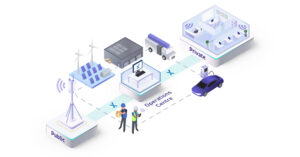In the world of enterprise connectivity, there is no “one size fits all” solution. The reason is simple – no two enterprises are the same! Because of this, many approaches to solving enterprise mobile networking challenges have evolved, each of which is better suited to certain applications than others.
One example is the traditional Mobile Network Operator/Mobile Service Provider (MxO) approach to use private Access Point Names (APNs) to create a dedicated virtual gateway for an enterprise customer within their public network. The MxO can pair this APN with VPN connectivity over the public Internet back to the enterprise datacenter, and operate the gateway on behalf of the enterprise customer as a managed service. This allows the enterprise to leverage a MxO’s public cellular network with an incremental level of security over the public APN that the vast majority of MxO customers use. Using SIM cards exclusively allocated to the enterprise customer, the enterprise can ensure that their connected assets like IoT sensors, video surveillance and connected workers are the only devices able to access their enterprise network. If a SIM profile or IMSI isn’t recognized, that device is denied access. The result is a connectivity solution that provides enterprise customers with an enhanced level of data confidentiality, integrity and availability.
Private APN Challenges
Despite these benefits, one area in which private APNs fall short is in handing off real-time, granular networking management capabilities to the enterprise. With a private APN, the MxO remains in full control of the enterprise’s access to the mobile network. Service events and troubleshooting happen on the MxO’s timeline – which, due to business differences, tends to be longer than the enterprise’s – and the burden of monitoring security controls is placed upon the MxO. Moreover, because the network address space for enterprises’ connected devices is controlled by the MxO, use cases that require fixed IP’s, bi-directional access or other specific networking requirements are difficult or impossible to accommodate. With numerous enterprise customers, countless consumers and an entire national network to manage, MxOs face an uphill battle to provide the dedicated and on-demand attention that enterprises require to move at the speed of business.
Another essential facet of modern business that private APNs hinder is data visibility. These solutions keep the MxO in control of the datapath, meaning that enterprises do not have real-time access to the data generated from their connected devices. This is not conducive to business success – in fact, it is not exaggerating to say that real-time data access is essential to conduct business today. “In a world where we are creating 2.5 quintillion bytes of data every day,” Bernard Marr writes for Forbes, “not only is it expensive to store old data, but the shelf-life of data is shrinking. The most valuable insights are always going to be in the most up-to-date data.” By withholding this access to real-time device data, private APNs directly inhibit the ability for enterprises to make decisions that improve business agility and efficiency.
Finally, because a private APN solution does not equip enterprises with the visibility they require, it remains surprisingly difficult for enterprise leadership to execute regulated and legislated fiduciary responsibilities to attest and certify matters of data privacy, exposure and access. Furthermore, using a VPN over public Internet to connect the private APN to the customer yields a non-deterministic data path that fosters unpredictable QoS and can violate data sovereignty and privacy requirements (e.g. GDPR). The challenge for global companies, as auditing firm, IS Partners, explains, is that they “understand how data flows to ensure that cross-border data transfers comply with the GDPR requirements.” Private APNs simply cannot satisfy this need for data visibility, thus jeopardizing legal responsibilities that can result in penalties of four percent of the enterprise’s worldwide gross annual revenue. And that’s just the fine – the actual cost for organizations that experience non-compliances problems averages almost $15 million.
Enter Expeto
Where a private APN solution fails in meeting medium-to-large enterprises’ needs for control, visibility and attestation, Expeto succeeds. By giving enterprises the power of control over their devices and data, enterprises can achieve real-time self-service networking and QoS control to drive their mission critical applications. Enterprise IT/OT teams can manage IP addressing on their WAN, troubleshoot and scale operations on their terms, forgoing lengthy MxO timelines to make changes, and achieve full visibility of the data path to ensure they meet regulatory requirements.
Additionally, instead of having to work with multiple MxOs in different international locations – each demanding a unique commercial relationship that increases complexity, confusion and cost at scale – enterprises can manage their global network of cellular networks from a single point of control. This allows IT/OT teams to drive consistency, simplicity and visibility across all of the individual networks that power their global business operations.
The Takeaway
Expeto is the world’s only Enterprise First® enterprise mobile networking platform, built in consultation with enterprise leaders and experts to overcome the traditional challenges of telecom first mobile networking offers. By creating a simple, agile and scalable platform-as-a-service offering, Expeto’s NeXtworking® solution once and for all gives the power of real-time, self-service networking control directly to enterprise IT/OT teams. For regulated industry, realizing this kind of control is not optional. As has been proven time and time again, the inability to protect enterprise data jeopardizes business operations, legal compliance and ultimately success. But when equipped with the power of control, businesses can better drive outcomes while ensuring that enterprise leaders can execute regulated and legislated fiduciary responsibilities to attest matters of data privacy, exposure and access.
With their networking needs satisfied, enterprises can finally trust mobile connectivity to power their mission critical operations and applications with the knowledge that their data is secure, accessible and attestable at all times. That is the power of enterprise mobile networking that knows no bounds.






